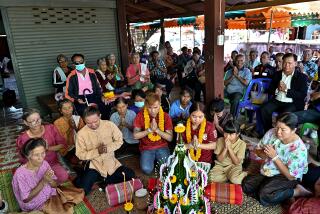On Guard Against a Flesh Trade
- Share via
BIRATNAGAR, Nepal — Of the thousands of Nepalese girls kidnapped to work in brothels across Asia, a brave few have returned to haunt their abductors.
Seized as adolescents, the women now stand guard at checkpoints along the country’s border with India to nab traffickers and rescue other girls about to be spirited out of Nepal.
Since 1997, when the women first took their posts, they have caught 70 suspected traffickers and saved 240 girls as they were being smuggled across the frontier. In a country where thousands of girls are kidnapped and sold into prostitution each year, the checkpoint guards’ efforts reflect a growing commitment to stopping the illegal trade.
For women such as Sushma Katuwal, sold for $700 to an Indian pimp when she was 14, the border duty offers a chance to reclaim the self-worth she left behind in a brothel.
“I came back from hell,” said Katuwal, who was freed by police after 13 months in captivity. “I am trying to stop these girls from being sold like I was.”
The capture of the suspected traffickers, usually in cooperation with police, has provided moments of high drama: Bursting with rage, some of the women guards have attacked suspects as police led them away. One woman chased a suspect into a canal, where he was hauled out and arrested. Others have coaxed traffickers and their prey back across the border and into the hands of authorities.
At the chaotic Biratnagar crossing, Katuwal, now 19, stood recently in a bright green sari, scanning the faces of girls as they came through. Hours passed in the pre-monsoon swelter before she stopped a girl seated in the back of a bicycle rickshaw. Katuwal asked her a few questions, nodded and waved her through.
“I know what to look for--it’s in their eyes,” she said. “These girls think they are going to jobs in India, but I have never seen one come back and say her life is better.”
Nepalese police credit Katuwal with nailing four suspected traffickers and rescuing 15 girls since the beginning of the year.
“Usually, Sushma is right,” said R. K. Shrestha, a police sub-inspector in Biratnagar.
The traffic in girls represents a national humiliation for Nepal, an impoverished country better known for its Himalayan treks. Experts here say most of these abductees are smuggled out of the country to brothels in India, where they are prized for their fair skin and East Asian looks.
Many of the Nepalese girls who wind up in Indian brothels come from the villages in the mountains, where literacy is rare and jobs are few. They often are lured by the promise of housekeeping or factory jobs in India or the Middle East. Once in India, they are held captive, sometimes in tiny windowless rooms where they service dozens of men each day. Some manage to escape; others are rescued.
The experiment to catch the traffickers was set up by Anuradha Koirala, who runs a home in the capital, Katmandu, called Maiti Nepal--maiti means “mother’s house”--for women brought back from the brothels. Most of the women are doomed: HIV-positive and without the money for treatment. Most will not talk about their experiences, which are regarded as shameful in this traditional society.
Three years ago, with the women growing restless, Koirala hit upon the idea of posting guards at the border. With the help of a grant from the International Labor Organization, she set up four guard posts on the frontier with India. She quickly had a houseful of volunteers.
“All the girls want to go to the border,” Koirala said. “They are angry but they don’t know how to express themselves.”
Katuwal, who stands less than 5 feet tall, is one of only a handful of returnees strong enough to tell her story. In 1995, when she was 14, floods washed away her village, Dhungra, in southern Nepal. Her father a sharecropper, the family was sleeping under a plastic sheet when a village woman asked her if she wanted to make money working in a garment factory in Katmandu. Katuwal, who is the youngest of five children and had never been to school, jumped at the chance to earn money for her family.
But instead of going to Katmandu, the woman took Katuwal by bus to the Indian border, where they were met by three men. Katuwal had never been to the capital and wasn’t sure what it looked like or how far away it was. When the men put her on a train, she began to worry.
“Where are you taking me?” Katuwal recalls asking her captors.
The men took her out of Nepal and across the subcontinent, to a brothel in the southern Indian city of Pune. She had been sold to the men, she later discovered, for 2,000 Indian rupees, about $50 at the time.
Beaten for several days, Katuwal says, she finally gave in. She remembers living in a small room with no windows and no furnishings beyond a ceiling fan, a bare lightbulb and a bed. Each man who visited her paid $3.50 to $12, depending on how long he stayed and what he wanted from her.
In a typical day, Katuwal recalls, she serviced 30 men, sometimes more. The brothel, a four-story building in Pune’s notorious Koothi district, housed 13 other Nepalese girls, most of whom, Katuwal guesses, were 14 or 15 years old.
“What could I do?” Katuwal asked, seated in the Maiti Nepal house. “I had to have sex with many men. I was so sad.
“From the first day that I was in that place, my goal was to punish the people who did this to me,” she said. “I never lost that faith.”
Many of the girls in the brothel were not so resilient. One, a Nepalese named Sarad, hanged herself from a ceiling fan.
Katuwal did not go outside the brothel for 13 months, when Indian police finally raided it. When she arrived at Maiti Nepal, she was found to be HIV-positive. Interview notes taken at the time of her arrival say she was learning to crochet.
“Plans: First she wants to arrest the criminals,” the notes say.
Katuwal attained her goal. Weeks after her arrival in Katmandu, while sitting by a window at Maiti Nepal, she spotted two of the people who had taken her to India. She screamed for help and ran out after the men.
“We all ran out the door, every girl in the house, and chased down the men and dragged them to the police station,” Koirala said.
Katuwal testified against the pair, and they were convicted in a Nepalese court, where one got a three-year term and the other was sentenced to five years. After that, Koirala decided to send Katuwal to the border.
“Sushma is very small, but she is very brave,” said Anjana Lana, another escapee who watches the border at Biratnagar.
As surveillance along the border has been stepped up, the methods used to smuggle girls through have grown more sophisticated. Often, police say, smugglers cross first and instruct the girls to cross by themselves later.
One day last month, as she sat in her tin shed watching the border traffic, Katuwal spotted a man standing just shy of the border. He was trying to coax a reluctant girl across. Katuwal, suspicious because the girl looked as if she was from the countryside, alerted the police. They arrested the man and, after interrogating him and the girl, charged him with child smuggling.
The girl, 16-year-old Beena Bhujel, said the man was trying to persuade her to go to Calcutta--about 250 miles away. The train on the Indian side of the border was just ready to pull out. Bhujel now stays with Katuwal at Maiti Nepal.
An uncertain future awaits Katuwal, a carrier of the AIDS virus who receives minimal doses of medication. At the next border post, at Kakarvitta, a friend and fellow veteran of the brothels, Dina, lies in a Maiti Nepal hospice near death from the disease.
But Katuwal seemed almost serene as she watched the rickshaws pass through the border crossing. When she first returned from India, her parents shunned her and sided with her accused kidnappers. Not long ago, after the men’s convictions, the family reconciled. Katuwal says saving kidnapped girls has given meaning to her short, traumatic life.
“As long as I survive,” she said, “this is what I am going to do.”
More to Read
Sign up for Essential California
The most important California stories and recommendations in your inbox every morning.
You may occasionally receive promotional content from the Los Angeles Times.













